This week we read the exciting news about the birth of a baby onboard the Buffalo. A number of family groups made the journey to South Australia in 1836 with many ships carrying infants and children. Imagine how this long journey would appear through the eyes of a child compared to that of an adult. […]
Share this page:
Sunday 25 December 1836
Christmas Day, clear, cloudless & beautiful; with the
thermometer at 68 Thoroughly disgusted with the conduct of the Governor
to-day. Such violence & ruffianism are without parallel, & his profane &
abominable oaths have driven all but his own & Mr Howard’s family
from the deck to seek refuge from the outrageous profanity in their own cabins.
Waiting for the Cygnet to come alongside with Capt Lipson’s family to
dinner. This is pushing on with a vengeance! The jaw of a remarkably
large shark brought on board It measured when extended six feet four
inches in circumference. The length of the animal was 19 feet. Its
liver alone yielded 25 gallons of oil & the weight altogether was estimated
at little less than five tons: it was taken in Nepean Bay.
Share this page:
Sunday 25 December 1836
Light winds & fine. S.E. Working to windwd
between Wedge isle & Thistle isle. Performed Di-
-vine Service on deck. P.M. Do Wr. Wind South. At 2
Captn Lipson & family came to dine with the Governor.
Light winds & fine. Working to the N.E. end of Wedge island.
Share this page:
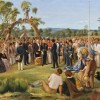
Week 45 – Journey’s end and new beginnings
Christmas Day dawns fine and hot in the settlements, with the colonists in pensive mood. Inevitably their thoughts turn to friends and family in England as they reflect on the very different circumstances of this first Christmas in South Australia. As usual Mary Thomas is the optimist. She attends a makeshift church service in the […]
Share this page:
Tuesday 20 December 1836
This day William, then a boy of fifteen, completed an oven which he made of iron hoops fixed in the ground in a half-circle and covered with a thick coating of clay, afterwards burned. It answered exceedingly well and we not only baked bread in it but pies and puddings, and occasionally fresh meat, when we could get it, but that was seldom. This oven was the first constructed in the colony, and remained in its primitive state, as I was told, long after we quitted Glenelg.
About this time we also built a rush hut a short distance from our tents for the better accommodation of part of our family, but they had not long occupied it before everything was suddenly ordered to be cleared out to make room for the printing-press, in order to print the Proclamation of the Colony. In this place, about twelve feet square, the first printing in South Australia was produced…
Share this page:

Week 44 – ‘excellent eating’: kelp, parrots and a new oven
In South Australia On 18 December Colonel Light sails the Rapid into the harbour on the Port River with the Tam O’Shanter close behind. It is an emotional moment for Light. In his mind’s eye he can see this harbour, ‘in a creek that had never before borne the construction of a marine architect’, as it might […]
Share this page:
Wednesday 14 December 1836
We had now been here a month, and certainly enjoyed the freedom of the open air and our spacious tent, which was oblong and large enough to divide into two apartments, in preference to the confinement inseparable from a ship’s cabin. But we were not destined to have these conveniences without alloy. Fleas, flies, and mosquitoes were innumerable. One or the other annoyed us incessantly, the first both day and night, which, perhaps, may partly be accounted for by our being so near a sandhill. The flies tormented us to such a degree that when I wrote my letters to England I was obliged to be constantly fighting with one hand while I wrote with the other, and no sooner had these retired from the contest than in the evening the mosquitoes came in such swarms as sometimes literally to cover the inside of the tent. We were obliged to have recourse to burning them out by burning some dry grass in a baking-pot; but this was not all, for the place was also infested with rats, whether native or imported I cannot say. They certainly were there before we arrived, for we frequently found their holes. They were different from the native kangaroo rat, were generally of a large size, and so bold that they seemed disposed to cultivate our acquaintance with rather more freedom than was desirable, often appearing in open daylight. They would scarcely be driven away. I had sufficient proof that they paid us nightly visits as well, for once I felt one run over my face. Having no means of keeping them out of the tent, I endeavoured to keep out other intruders (at least, at night) by pinning the canvas door to opposite sides and then placing a pail of water near it, so that if anyone attempted to enter they might have a chance of falling over it. Though this never happened, not infrequently in the morning I found a drowned rat in the pail. On one occasion, also, when I awoke, two of these animals were quietly seated on a chest of drawers, which stood at the foot of my bed, apparently watching me, and without attempting to move till I drove them away.
About this time our eyes became affected with [tooltip color=”grey” text=”An infectious inflammation of the eye. Also called Trachoma or Egyptian Ophthalmia.”] ophthalmia[/tooltip], which was then so prevalent that I believe very few of the settlers entirely escaped it. Many of the natives had it, and even the dogs suffered. My son William became totally blind one Sunday while attending Divine Service in the open air, and was led back to the tent by his brother. For myself I was nearly so for three days, and could scarcely find my way about. We had a skilful physician, however, in Doctor Wright, who came out with his wife and family in the Cygnet, and was at that time the only medical practitioner in the colony. Excepting this disease, which was extremely painful while it lasted, we were generally in good health.
Share this page:
Friday 9 December 1836
This morning Mr Fisher & I had a characteristic
scene with the Governor. The latter has always impressed upon me that
it was his right to fix the site of the Capital, & till I saw Colonel Light’s
instructions I believed this to be the case. Undeceived, I was determined
not to be played upon with impunity & accordingly I told the Governor
in Mr Fisher’s presence that he had misled me, and was himself al-
-together mistaken; that I had read the Commissioners Instructions to
the Surveyor General, & the fact was that it rested solely & exclusively
upon Col. Light’s responsibility to fix the site of Adelaide. The polite &
dignified remark in answer was that “he did not care a — for any
order of the Commissioners & he would fix the seat of Government
where he pleased. It was only his private confidence in Col. Light’s
discretion that would lead him to submit to his decision: he had
Lord Glenelg’s authority for all this, & for setting the Commissioners
at defiance”. I doubt this; & indeed have no further confidence
in the truth of any thing he says But for the consideration my family
& their interests demand I should not remain an hour in my present
position. It seems more & more desirable that the Governor’s powers
should be defined strictly, or some strange antics we shall have; –
but it is far more to be wished that in selecting an individual for
the high office he fills, care had been taken to find a gentleman of
common sense who had little occasion for other brains than his own
& who would despise to lay his own follies entirely upon the shoulders
of honorable men. On the [tooltip color=”grey” text=”Technically called a stern deck, the poop is an exposed partial deck on the stern (rear) of a ship. It forms the roof of the stern or ‘poop’ cabin.”] poop [/tooltip] watching the sun going down, the
Captain observing to Margaret “They that go down to the sea in ships”
she, unintentionally perhaps but not inappropriately continued the
quotation “they reel to & fro & stagger like a drunken man & are at
their wit’s end”. He replied “You may be at your wit’s end, Mrs S,
but it will not do for me to be at mine, I shall have employment
enough for them!” Margaret thought of Wordsworth I suppose for she
quoted half-aside, “Good help thee silly one!”.
Share this page:
Sunday 4 December 1836
Our chaplain ill – worried to death by the proceedings
of our gentlemanly mess towards his wife & family. In consequence
we had no service. The sermon of good Dr Wilson [tooltip color=”grey” text=”Soder and Man is a diocese of the Church of England”] (Sodor & Man) [/tooltip]edified
us in the morning & one of Jeremy Taylor in the evening – so that
except in the public observance of the sabbath which is here a
mockery, we were no losers…
Share this page:
Friday 18 November 1836
Friday Nov. 18. Availed ourselves of the advantage of a calm to obtain
several specimens of the sea birds which flock around us. Three species of
the Longipennes family were shot, among which the wandering albatross
(Diomedia exulans) was the finest; it measured 10 feet 4 inches from
tip to tip of its wings. We had also an opportunity of contrasting the
elegant blue petrel (p. Vittata) with the largest of the tribe (p. gigantea)
& of proving the singular deceptiveness of vision regarding objects seemingly
but a short distance on the water. The albatrosses from the [tooltip color=”grey” text=”Technically called a stern deck, the poop is an exposed partial deck on the stern (rear) of a ship. It forms the roof of the stern or ‘poop’ cabin.”] poop [/tooltip] though
constantly near enough for us to observe that it was scanning us,
never appeared larger than a goose of moderate size, but when
brought on deck, the least of them far exceeded in bulk & weight
the largest swan we ever saw.
Share this page:
Sunday 13 November 1836
NOVEMBER 13.-This day the girls and I packed up our bedding and such things as remained in the cabin, and went on shore to the place of our present destination. It is remarkable that we finally set sail on a Sunday and landed on a Sunday. We had two tents, the smaller of which the men had erected, and of which we, with part of our family, that is, our three daughters and the young woman who came out with us as assistant, took possession, gladly enough, though everything was in the roughest fashion imaginable. The two men located themselves in the sandhills, making a circle with packages and furniture and sleeping in the middle.
As for my two sons (for Robert had now joined us for the present) I made up a bed with a thick mattress on the ground in the open air, and as near as I could with safety to a large fire, and saw them asleep before I ventured to retire myself. My anxiety, however, would not suffer me to sleep much for that and many succeeding nights. Towards morning, however, I fell into a slumber out of which I was suddenly startled at about 5 o’clock by the loud crowing of a cock, which, with some hens we brought from the Cape of Good Hope, had roosted in a bush close to the back of the tent. I got up at the summons and, hastily dressing myself, went to see after my boys, both of whom I found fast asleep. The quilt that covered them was so saturated with dew that I could have wrung the water out of it. Yet they took no cold, nor seemed at all the worse for their night’s exposure, although it must have been very cold, as was proved by the following circumstance. A pewter jug had been accidentally left outside the tent in a tin dish containing some water, and on lifting up the jug to my surprise the ·dish came up with it, for the water had frozen to an eighth of an inch in thickness. This astonished me in a country where I did not expect to see such a thing, and yet the thermometer rose that day to [tooltip color=”grey” text=”About 43 Degrees Celsius.”] 110 degrees [/tooltip].
Share this page:
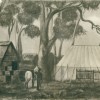
Week 39 – settling in at Holdfast Bay
In South Australia Colonel Light is busy making arrangements to secure food and means of transport for the new settlement at Holdfast Bay. He contracts with Captain Duff of the Africaine to buy sheep, oxen and carts in Hobart and writes a long letter of explanation to the Commissioners in London to justify his purchases. […]
Share this page:
Thursday 10 November 1836
Thursday Nov. 10. A poor woman making dreadful complaints
of the Hindmarshes. We have heard many such, but this is worth
chronicling from its peculiar offensiveness. The woman & her husband
had been almost enticed on board & she had been promised by the
ladies of the family every comfort during her confinement. She is
deserted & cannot get even a potatoe notwithstanding the blarney by
wholesale uttered by Mrs Hindmarsh in a visit to her on Sunday. The
Captain’s son’s dog Diana had a house built for her at His Majesty’s
expense & dinner sent regularly to her with every “delicate attention”;
but the Captain has lived too long in the “East” – he was Master of
a Steamer belonging to the Pacha of Egypt where a “dog of a
Christian” is the lowest animal in the scale of creation. Poor Mrs Pike!
Share this page:
Thursday 3 November 1836
NOVEMBER 3.-This morning a boat containing some white men and one black woman, an aboriginal native, arrived to concert measures for discovering the ramblers. From the different accounts which we heard we really began to be very uneasy about them, but these people seemed to be under no apprehension as to their final safety. They said that the journey across the island which they proposed was utterly impossible, as the brushwood would so completely entangle them that they would lose their way and might never be found again, either alive or dead. But before I proceed any further I must give some account of the black woman, who, being the first native we had seen, excited our curiosity. Her clothing consisted of a red woollen cap, such as sailors often wear, and a shirt of the same material under a coat of thick leather, such as in England is used for harness and to cover trunks. Her countenance was pleasing, though perfectly black, and her hair not woolly, like that of African natives, but long and straight on the forehead. Her legs and feet were bare, and round her neck hung several rows of glass beads. Her chin was also ornamented with a kind of beard, and whiskers grew at the sides of her face. But what most surprised us was her musical voice, and the pleasing intonation with which she spoke the English language, for what she said she uttered with a proper accent and almost with fluency. Her height was about five feet six inches, and her age apparently about twenty-five years, but on being asked how old she was she replied, ” I cannot tell,” and this is the case with them all. She was taken into the steerage and regaled with biscuit and beef, which she seemed to relish exceedingly. She talked with great confidence as to being able to trace the young men, as she knew every part of the island. She added that there was no fear of their perishing, especially as they were provided with guns.
As soon, therefore, as it had been pointed out by the map on what part of the island the missing passengers had landed, the men, with the black woman, departed in the boat and Mr. Thomas accompanied them. He went to arrange with Mr. Hallett, who, with his family, had landed on the island and erected a tent there, as to what remuneration should be given for the search and how it should be conducted. At length it was agreed that four men and two women should set out immediately, with a sufficient supply of provisions and water, in a boat to that part where the young men had landed and follow them through the bush until they came up with them. For this service they were to receive six pounds. Accordingly they set off.
Mr. Thomas returned on board, and we then learnt that royalty itself had condescended to pay us a visit in the person of the black woman, for she was no other than the Princess Con, daughter of King Con, a chief of one of the native tribes. Her father was at that time on Kangaroo Island.
In the evening the sky was again illuminated by the burning brushwood.
Share this page:
Saturday 29 October 1836
Hobart Town, Oct. 29th 1836.
My Dearest Mary,
I have at length an opportunity of writing you, by the ship, Elphenston, to inform you that we have all arrived safe at our port; the first part of the passage till nearly as far as the Cape, we had very fine weather, never once having ocasion to take a reef in, but the remainder just nothing but dreadful gale but we did not suffer any loss, she being a very fine sea boat, and I made Kangaroo Island to the hour, the other two ships the Duke of York & Lady Mary Pelham, having left England one ten & the other fourteen days before me, arrived but five & ten days before me, so I think I don well in so small a vessel, particularly as both those vessels where fast sailers having been both Packets, the two Commissioners Ships we beat one fourteen days & the other six weeks, I was three weeks short of four months from Dartmouth, nothing particularly happen’d on the passage except one of our women passengers jumpt overboard in the heat of passion, the vessel was going at the rate of six knots at the time, I put the vessel about emidiately & stood towards her & succeeded in picking her up just as she was going down, she soon recover’d but blam’d me for saving her, she afterwards refused to take any food or nurishment till she became really ill and …………….. leaving a husband and four young children one not then ween’d, but it was a great blessing to them all, for she was a most horrid wretch, all the rest I landed safe & well satisfied, but not so with either of the other vessels for they appear’d to have had nothing but quarreling all the passage out, and on shore after they landed, & the crews of the vessels in a very insebordinate state, till my arrival, and I soon set them to wrights, after having set them in Irons and it was out of the Manningers power to rule them, ther being no Gov. nor any power to inforce obedience, I on the contrary have not had the least dificulty with any one on board, after I had restored them all to good order & disiplene, the first Mirical I don was to join together two couple in holy Matrimony, one was no less a person than Mr. Stephens, the Maninger, after which I set about exploring the country, but found Kangaroo Island, a most wretched & barren place not worth anything, & feeling uneasy at the appearance of future prospects, I took a whaleboat, mand and arm’d it well, & went over to the main, which is but twelve miles across, I proceeded up the gulf of St Vincents to the distance of from 100 miles or more, landing ocasionally and walk’d inland, & I must confess, that in all my travels I never saw so fine a country before & abundance of fresh water, and but few natives, not having fell in with more than eight in all that extent of country; on my return I found the vessel nearly ready for sea again and having made my arrangements, and occording to my advice we proceeded for Hobart Town for sawd timber & such articles as I saw them most in need off, we had a very good passage of six days and had scearsly got in the river before Hobart Town was viseted with a continuation of most terrific gales for three weeks, such as has not been before experienced in the memory of any one in the Island, thank god is was now my watch below, on my arrival I was most heartely wellcom’d by every person I met…
…
Robert & George is going to school to morrow to Mr. Giblins Father, a very good school at New Town where I have got them to take both, through favour, for fifty pounds a year, I have provided them well with everything, & I am happy to say they are fine Boys & loved by everyone who knows them, I have great hopes in them, & I trust in God, that my dear girls will prove a comfort to us also – I hope & trust you are all well in health, and that you have been abble to mannage to rub through. I have wrote to Mr Angas who I have no doubt will render you every assistance in his power & advance you what money you may require to fit yourself & children out little respectable, and also procure you a passage out, either to Kangaroo Island or Van Diemens Land, but I think you had best if possible endeavour to get to Hobart Town first, & I will see you shall be provided for on your arrivel, but should you arrive at Kangaroo Island first, you will find yourself well received, I shall have a house built, and a garden for you before you arrive; endeavour to provide yourself & children as respectable clothing as your means will enable you, I am thank God in better health than ever I was & getting very lusty, & I have every prospect of dooing well, having an oppertunety of making a good deal trading backwards & forwards to the —. Mrs. Stephens is inclined to afford me every oppertunety of adding to my stock, therefore with the blessings of God I trust we shall yet see better days, & God send you safe to me again, The best month for you to leave England so as to insure fine weather will be in the months of June or July, I hope your brother & all his family are all well and in prosperety, I have wrot to them, & I hope & trust Mother & Eliza with her children are also well & that you are friendly with all for belive me my dear Mary that it is far more pleasing to make friends than enemys, I sepose Parnell is dead, & I trust he died a christian, & confeced his falshoods, should your Mother & sister come out to this part I will do all I can for them, give my love to them, also give my love to Mr. & Mrs. Barrow, Carters, Quillys, Ann & all inquiring friends – Mrs. Lord lives in the country and I am informed she looks as well as ever, Should you see Mr. Simpson the Father of my secont mate give my best respects to him & his family & tell him I have great pleasure in giving a good account of his son, he behaves himself mutch to my satisfaction, he has been very attentive to my two Boys, in teaching them to read and write; & I shall not fail in advancing so soon as I see a good oppertunity.
You must take cear to have a few comforts with you when you leave, independant of the ship, as you are an old Traveler you are well aquainted with what is necessary, be sure you take plenty eggs with you for the children, you see that I have not been afraid to face my enemys, but I assure you that I have not one is thes whole place, & to prove that my credit is good, I have sold Bills … of £200 for articles purchased her for our settlement, and it will I trust convince those persons who gave your Mother such favourable account of me, that I am not afraid to meet any one in this world that I have seen before, I hope Marian is a good girl and is kind & obedient to you, for she ought to be a patern to the rest, I have no fear of Georgiana , give my love to them all & kiss them all for their Father. I hope little Tom is growing a fine boy as will Isabella, Polly, & dear little Stewart. I hope you have not neglected poor Polly lip, Robert & George send their dear love to you & their sisters & brothers, Robert never hears your name mentioned but he crys bitterly, poor George he often talks of you but of course have not that sense of feeling, he is the fiddle of the vessel, once more give my love to all inquiring friend and accept the love of
Your ever Afectionad Husband,
George Martin.
Mr. & Mrs. Bascombe sends
their best respects
God bless you & send you soon to me.
Bring the certificate of your Marriage & the births
of Marian & Thomas, for should anything happen to me
you can get your Dower of that 800 acres of land which
is now become very valuable.
Share this page:
Saturday 29 October 1836
29 October-Very sudden changes, hot and cold alternately, with showers. At five p.m. Captain Lipson and Mr Pullen arrived in the hatch-boat, from Nepean Bay. I wrote to Captain Rolls of the Cygnet to receive on board Captain Lipson and his family and proceed to Port Lincoln.
Share this page:
Thursday 20 October 1836
OCTOBER 20.-This day the thermometer was reduced to freezing-point.
When we left London we had on board a young man of the name of Constable, who acted as second mate, but for some reason, which I do not know, he was left at the Cape of Good Hope… The absence of this young man from among the officers of the ship was regretted by many of the passengers, as he was very civil and obliging. The chief mate was just the contrary, and seemed to take a delight in annoying the intermediate passengers whenever he had an opportunity to do so… Among other instances in which he displayed his authority was that of removing the step-ladder, preventing us from going on deck, or occasionally keeping us there during his pleasure when we wished to return to our cabins. It so happened that the trapdoor by which access was obtained to that part of the hold where the ship’s stores were kept was on a level with the floor of my cabin, and only a few feet from it. The ladder by which we ascended to the deck rested on it, and was consequently removed and generally drawn up whenever the storekeeper had occasion to descend to the hold for supplies… It so happened that whenever the aforesaid store was opened we were almost sure to be half-smothered with dust. Moreover, ·a considerable quantity of straw and chaff were generally left for anyone to clear away who chose to do so, but being nearer to us than to any of the others, of course it fell to our share to dispose of it in the best way we could. This we did for a long time without complaint, but one day, a larger quantity of rubbish than usual being deposited close to our cabin door, and seeing no reason why those who left it there should not clear it away or cause it to be done, I went on deck with the intention of asking one of the sailors to remove it. Meeting Mr. Smith, I drew his attention to it, and requested that he should send someone with a broom for that purpose. Not only did he peremptorily refuse to send anyone, but replied to my request with the most insulting language, insomuch that I threatened if he behaved to me in that manner again I would complain to the captain. He told me I was welcome to do that, and, pointing to the quarter-deck, said, “There is the captain. Tell him what you please.” But the captain was not there at the time, or I would have applied to him immediately. Determined, however, to put a stop, if possible, to the mate’s insolence, I resolved to take his advice and appeal to the captain as the only way. Accordingly, the next day I addressed the following letter to Captain Duff:-
Sir-As I presume you will not knowingly suffer anyone on board this vessel to be in any way ill-treated, I consider myself justified in stating to you the particulars of an occurrence which happened a few days ago, in which I was grossly insulted by Mr. Smith, the chief mate, and which likewise led to an altercation last night on the deck, the circumstances of which I think you ought to be acquainted with. But before I proceed I beg leave to state that the complaint I am now about to make has no allusion whatever on my part to anything that passed on a former occasion, nor did I give Mr. Smith the slightest provocation to treat me in the manner he did, but I cannot, in justice to myself and my family, tamely submit to such repeated insults as we have experienced from him since we have been on board this vessel. You must be well aware that all those in the intermediate cabins, ourselves in particular, are greatly annoyed by the frequent opening of the hatchway leading to the hold, and that at all hours of the day, by which our ingress and egress are not only often prevented, but we must also put up with the dust and litter proceeding from the stores, with many other inconveniences, to which even the steerage passengers are not subjected, but all this we should not complain of, knowing it is unavoidable, if we could meet with that civility and attention which, as respectable persons, we think ourselves entitled to, for in this respect I speak in the name of all concerned, though the ungentlemanly behaviour it produced from the chief mate was directed to me alone. It happened, then, a few mornings since that the storekeeper had left a more than usual quantity of dust and dirt, which, as usual, was left for us to clear away, and, being opposite to my cabin, it was not very pleasing or agreeable. Mr. Thomas, therefore, sent a message to the mate requesting a broom and mop to enable us to clean it, but his answer was that he had neither, and if Mr. Thomas wanted them he might fetch them himself. This passed, and we took no further notice, being compelled to let the litter remain till a short time after, when I went on deck, and seeing Mr. Smith close by I pointed down the steps and requested that he would send someone to sweep away the dirt there, to which, with a scornful air, he replied, “Pray, Mrs. Thomas, who do you expect to clean it?” I said it certainly was not my place to do it, nor did I suppose that anyone there considered it their place to do so, that if we swept our own cabins it was surely sufficient without cleaning after the ship’s crew. He then asked me where our servants were, saying that we had too many servants, and if I expected anyone on board the vessel to be my servant or to do anything for me I was mistaken, to which I replied that it was not my servants’ place any more than mine to clean after his men, and supposing that we had brought no servants on board, how was it to be done then? “Done,” says he; “why, do it yourselves, to be sure.” This was his precise answer, to which I replied that I would not be insulted by anyone, and that if he behaved to me in that manner again I would complain to the captain. “There is the captain,” said he, “on the quarter-deck. Go and complain to him.” If you, Sir, had been there at the time, I would certainly then have made you acquainted with his conduct, as I cannot suppose that you or any gentleman in the cabin would suffer his wife to be insulted. Of course, I related what had passed to Mr. Thomas, and in consequence of Mr. Smith’s refusing to allow such a trifling request as mine to be complied with he forbade his men to assist the crew in any way whatever, which before they had done on all occasions, not only with his sanction, but particular desire, and he always felt a pleasure whenever their services were available in any way. Yesterday morning the same annoyance again occurred from the stores, when a quantity of chaff and straw was left and the same neglect ensued as before with regard to clearing it away. Therefore, when Mr. Thomas saw his men pulling the rope (for it seems Mr. Smith had asked them if they meant to mind what that foolish man said), he again forbade them, which he would not have done, notwithstanding his previous orders, could we be treated with common civility. But Mr. Smith has taken every opportunity to annoy and insult the passengers in this part of the vessel from the day we embarked to the present time. As another instance of his discourteous behaviour last night he prohibited the cook from baking any more bread for the intermediate berths, a luxury which we have seldom enjoyed since we came on board, but there being two loaves in the oven at the time, one belonging to me and the other to Mrs. Lewis, he compelled the cook to turn them out half-baked, and, of course, spoiled; but as there can be no reason why others should suffer on my account, and as I consider myself more especially the party aggrieved, I have taken upon myself to state these particulars, and now appeal to your justice as commander of this vessel and to your generosity as a man whether you will suffer such conduct to pass unnoticed. I am, Sir, your obedient servant, MARY THOMAS.
This letter was politely answered by Captain Duff assuring me that I did him justice in assuming that he would not knowingly suffer anyone on board the vessel to be uncivilly treated while he had the command of it, and that he would take care that there would be no cause for complaint in future. Whether Mr. Smith received a reprimand or not I do not know, but the next morning, to my surprise, he inquired if I wished first to go on deck, and added that the ladder would be replaced as soon as possible. From that day his churlishness seemed in a great measure to have left him, at least as far as the passengers were concerned, for I am not aware of anything unpleasant occurring afterwards to the end of the voyage.
Share this page:
Thursday 13 October 1836
Thursday Octr 13. To-day at 12 upwards of 120 miles from Rio
This evening, Mr Fisher, the resident Commissioner fell down on deck
in an epileptic fit, from which he seemed to suffer much. From the
coolness with which his family looked on amid the general alarm I appre-
-hend that he is subject to such attacks. If the Commissioners at home did
not know of the fact, I think it would be right to inform them, as no
provision that I know of has been made to carry on the duties of his
situation in the event of his being suddenly incapacitated. Another characte
ristic bit of authority on board to-day. The dogs belonging to the passengers
have been refused their modicum of water; those belonging to the Captain
were not included of course. Not to say a word on the score of humanity,
popularity is known to be very fleeting & his Excellency therefore takes
no care to secure even the smallest portion of that perishable commodity
But the expression of disgust was too strong & general upon the subject
to be resisted, & the order was rescinded in the course of the evening
in the hope that the malcontents would be duly sensible of the
favor done them by the non-exercise of the power possessed at sea
by a Captain in the Royal Navy!
Share this page:
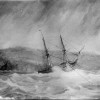
Week 34 – a tempest
In South Australia Light continues his exploration of the coast, although he is beginning to doubt the existence of the harbour Jones described. For the record he copies Jones’ description into his journal, which allows us to be fairly certain that the anchorage in question is Port Adelaide, but clearly this was not obvious to […]
Share this page:
Tuesday 4 October 1836
Tuesday Octr 4th. Anchored in this beautiful harbour at
last; fired a salute of 11 guns to the Admiral & 21 to the
Brazilian flag. Went ashore immediately with my family
and found all our friends at Rio well and glad
to welcome us. Our Colony has created great interest
here —
Share this page:
Sunday 2 October 1836
Sunday Octr 2. The breeze a little more favorable, and
our hopes of reaching Rio in a couple of days revived. No
public service to-day as there is a heavy sea rolling Mr Howard
read prayers in the Ward-room most of the Ladies & Gentlemen
were present. Neither the Governor nor any of his family I
am sorry to say, attended, although they were advised of the
intention. To-day the first albatross was seen. It was a
white one the [tooltip color=”grey” text=”Wandering Albatross”] Diomedea exulans [/tooltip]…
Share this page:
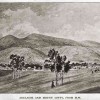
Week 33 – seeking a site for settlement
In South Australia Colonel Light and his surveying party continue their slow progress up and down the coast, still searching for Jones’ harbour and for fresh water. They find Sturt Creek and Light is encouraged by the many fresh water lagoons nearby. With some prescience he records : ‘The little river, too, was deep; and […]
Share this page:
Tuesday 27 September 1836
My Dear Sir,
…Nothing is yet done (or rather nothing yet appears to have been done towards paying a Dividend, but I assure you, that most deliberately & coolly, I at this moment consider the shares of the [tooltip color=”grey” text=”South Australian Company”] S.A.C. [/tooltip] to be worth more than I ever expected they would be in so short a time – In four or five days [tooltip color=”grey” text=”Deo Volente – God willing.”] (D.V.) [/tooltip] I shall go over to Cape Jervis with the view of Discharging the “Emma” on her arrival at “Yankalilla” & there forming forthwith an Agricultural Establishment, for which purpose I think of employing that Vessel to fetch up Stock. The John Pirie must keep at work fetching Sawn Timber as there is no timber here or there that is worth a rush for building. I wish I had 3 or 4 more such handy & roomy little Craft as the “Pirie” – I could employ them so as to return us a handsome Profit & I hope you will press upon the Board the propriety of sending out more whale ships – Nothing can be more suitable than the “Lady Mary Pelham”, she is exactly the thing. – Our two whalers intend to return here next May & take the Black Whale season (in which they can hardly help doing well) & then after refreshing – Proceed on an Eight months Cruise for Sperm & this is the course all our ships (except very large ones) had better pursue…
Share this page:
Wednesday 21 September 1836
SEPTEMBER 21.-This day, Wednesday, about noon, we anchored in Simon’s Bay. A gentleman and lady in the cabin of the name of Hallett, with their family of three children and a servant, joined us in a boat, as they preferred going on shore with us rather than with the cabin party, on account of their family. Some black natives came alongside, and we engaged one of their boats. When we reached shallow water, there being no jetty, we were carried on shore in the arms of the men, to our no small amusement, and my daughter Mary was the first of our party to set foot on Africa.
There is a small town here, as they call it, which consisted entirely of one street, or, rather, of one row of houses at the base of tremendous hills and facing the water. The whole much resembled a newly-founded watering-place in England. The inhabitants were chiefly English, with some Dutch, but we saw a great many of the native Africans, quite black, with woolly hair. They took much notice of us, and seemed to be well a ware that we had just arrived from England.
We went to the Anchor Inn, kept by an Englishman; others to different inns and lodgings, of which there were several in the town. We partook of lunch as soon as we arrived, of bread and cheese and butter, with bottled ale, all of which were excellent. Never did I relish anything so much, after being so long confined to ship diet, and this seemed to be the case with everyone. We then took a walk, as the weather was very fine, and returned to dinner at 4 o’clock. This consisted of a boiled leg of mutton and rump steaks, with potatoes and cabbage, followed by a bread pudding and excellent pastry. Four bottles of Cape wine were also placed on the table, and everything seemed to be in a style which we did not expect from the appearance of the place, especially as the Anchor was not the principal inn, which was called the Clarence, and where we first went. Some of the cabin party having taken possession of the latter house, the landlady turned us out rather unceremoniously, at which we were not a little surprised, considering our number – fourteen in all. However, we immediately went to the Anchor, and there remained till Friday afternoon, and most likely were the better customers, as all the cabin party set off the same night for Cape Town, about twenty miles distant…
There was not much to he had at Simon’s Bay besides fruit as the shops, or stores, as they were called, contained but little stock…
A sort of caravan, resembling a London omnibus, drawn by six horses and driven by a Malay with a tremendously long whip, brought the captain and party from Cape Town. I heard one gentleman say that he rode in one drawn by fourteen horses, but they are invariably small, and would bear no comparison with those of England. We likewise saw a light wagon, to which were attached eighteen bullocks.
The oranges are very fine. I bought a hundred for three-and-sixpence, also a hundred of a smaller sort, called snatches, for a shilling. Mr. Thomas purchased a box of raisins, containing twenty-eight pounds, for four shillings. They were very sweet and without stalks. There was also a great quantity of dried fruit, such as apples, pears, and apricots, but we were too early for grapes and melons, as we arrived in the spring…
Mr. Thomas purchased some potatoes for seed, and a roll of canvas for a tent to supplement a large one which we had on board…I bought a quart bottle of genuine cayenne pepper for seven-and-sixpence, some of which I have to this day.
I mention these things to apprise those who may have forgotten to provide themselves with some such necessary articles, and are fortunate enough to put in at the Cape of Good Hope, that they may be obtained at Simon’s Bay on reasonable terms, and I believe still cheaper at Cape Town. No doubt, in the lapse of time since we were there (nearly twenty-eight years) everything has been greatly improved and the stores are supplied with a greater variety.
On the whole we enjoyed ourselves very much, and so well satisfied was our landlord that before we parted he insisted upon our partaking of a bottle of champagne, and wished us a good voyage and prosperity in our new settlement. We had some difficulty in making him understand where it was to be, for at first he imagined that we were bound for Van Diemen’s Land, South Australia being then a new name for the colony, and I believe not till we arrived at the Cape had the inhabitants heard of such an intended settlement.
I must here mention the wine called Constantia, which, as our landlord told us, can only be produced in two or three vineyards within a small district where the soil is favourable to the growth of a particular grape from which it is made. It is very rich in flavour, and was indeed a treat to us. It sold at two shillings per bottle. The ordinary Cape wine was sold at a penny per glass. Mr. Hallett’s and our men were on shore drinking it as they did beer in England. It got the better of them, and they continued drinking and smoking nearly all night, making such an intolerable noise that we could not sleep. However, they seemed to enjoy themselves, like their masters, and the next day we treated them to a good breakfast and dinner, with sufficient wine to make them comfortable without being tipsy. They returned to the ship highly gratified.
Share this page:
Tuesday 20 September 1836
This 24 hours gentle breeses from the NE fine weather at 7 fired a gun a signal for sailing and hove in some cable at 9 hove the anchor off the ground but found the vessel canted the rong way gave the ship cable again and got out the cadge to cant the ship hove […]
Share this page:
Sunday 18 September 1836
We are now within 400 miles of the Cape of Good Hope, the
passengers are all expectation…
You ask me to describe my chum Mr Williams
– well then – he is middle sized – wears a black wig – has red
eye lashes – he is very kind to me indeed as well as to everybody
else – in the next cabin is Mr Thomas though a very goodnatured
man, is nevertheless very hot-tempered; though I have never felt
his wrath he does not appear to be liked very well by the Mediterranean
Passengers (as the steerage folks call us). Mr Everard and
family come next. Mr Everard is a very nice quiet man,- but his
wife just the contrary – the next is Mr and Mrs Lewis they are
very quiet, but Mrs Lewis does not appear to be very respectable
– the next is a Mr Ward and Mr Deacon – Mr Ward is a very
goodnatured, humorous man of about 30 years of age rather
corpulent – he is a lawyer – Mr Deacon is a rather old man very
changeable and fidgetty – Mr Nantes and Mr Skipper are the
next. Mr Nantes is a quiet young man – Mr Skipper is a person
I don’t know very much about on account of his taking his meals
in the 1 st Cabin.
Share this page:
Monday 19 September 1836
… I took a boat and
went to the new setlement wher the Cignet landed her
emegrants they have twelve military tents erected and
all the emegrants emplyd some building a store house
out of bussh and Captn Lipson building a bussh house
for part of his large family some cooking and so on
we dined with Dr Wright and family in his tent all
in this setlement seems to be carryed on with experdition
and order and serbordernation we returned to the other
setlement I found three of my crew drunken Clavil
Lidard and Spratly we had no disturbance with them
we had a meeting and conferance spoke mostly on
drunkeness I knew in one ship of three cases men loosing
thier lives through drunkeness
Share this page:
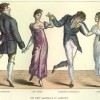
Week 31 – Farewell to the Duke of York
In South Australia Sadly, we bid farewell to Captain Morgan and the sailors of the Duke of York this week, as they finally set sail for Hobart and the whaling grounds off Australia. After seven months…
Share this page:
Saturday 17 September 1836
This 24 hours gentle breeses from the NWd AM prepared to git
under weigh at noon unmoored ship and got under weigh
came to anchor faceing the setlement in 4 [tooltip color=”grey” text=”A fathom is a measure of depth in the imperial system. One fathom is equal to six feet or 1.83 metres.”] fathoms [/tooltip] water
cleared the decks down and prepaired for sabath…
Share this page:
Wednesday 14 September 1836
This 24 hours light winds and squally attended with calms employd cutting wood and doing other nessary work carpenter repareing the boats we found some fine chaulck and procured some for Ships use In the evening had family service read part of 16th chapt of St John with commentry
Share this page:
Tuesday 13 September 1836
This 24 hours light wind and [tooltip color=”grey” text=”A squall is a sudden, sharp increase in wind speed.”] squalls [/tooltip] with rain
employd cutting wood and other nessary work the carp
enter reparing the boats
In the everning had family worship read the word
of god with singing and prayer
Share this page:
Tuesday 13 September 1836
Tuesday September 13. This morning the south east trade
wind reached us and we are now within 100 miles of the equator.
A conversation with the Governor, Mr Fisher, & Mr Jickling
to-day on the subject of the establishment of a Public
Library in the Colony, regarding which both Mr Fisher and
myself are exceedingly anxious. The governor is inclined
to throw cold water on our project. “It is of no use,” said he,
“what good will books do our Colony?” but I strongly
suspect neither Fisher nor myself will be deterred from
doing our conscientious duty by such an opinion. The
ship continues to be made a carpenter’s shop, – hot-houses
dog-houses and other sorts of houses for the Captain
are in progress, and there is from morning to night such a
complication of noises, hammering, sawing, planing,
that the Ladies & passengers and Emigrants generally
suffer dreadfully from these various annoyances.
Little regard indeed is paid to their comfort at any
time: poor Mrs Fisher has the carpenter’s shop precisely over
her bed, while that part of the [tooltip color=”grey” text=”Technically called a stern deck, the poop is an exposed partial deck on the stern (rear) of a ship. It forms the roof of the stern or ‘poop’ cabin.”] poop [/tooltip] under which are the
cabins of the Governor’s family is carefully secured from
noise by being covered with trusses of hay. The Governor’s
dogs are allowed to run loose, bite, as they have done, the
Emigrants & crew at their pleasure, and to perform all
manner of beastlinesses where they have a mind; while
the dogs of the passengers are sedulously cooped up.
In a man-of-war it seems the Captain’s property and
chattels are always especially attended to; those belonging
to others must take their chance – that is the rule. It is
a pity Governor Hindmarsh should act upon it. Public
respect & popularity are not usually acquired by decided
acts of selfishness.
Share this page:
Monday 12 September 1836
This 24 hours strong winds from the southd attended with rain employd wooding and other jobs as needfull carpenter fitting the boats In the evening had family worship read the 32d chapt of exidous with comment sung and found god to be Jehovah sung with melody in our hearts – I find to day that […]
Share this page:
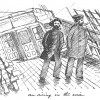
Week 30: Heating up and lighting the way
We catch up with Gouger on board the Africaine once again this week. It is becoming much colder on the ship and his family does not have enough warm clothes to wear. Gouger writes in detail about the facilities in his cabin and on the Africaine that enable him to have light, filter water and live […]
Share this page:
Thursday 8 September 1836
Before leaving [Kangaroo Island] the Colonel engaged a man by the name of Cooper
& his family, a sealer & had been about 7 years on the Island he was to
act as Pilot his wives (two native women) and Kangaroo dogs
were to supply us with fresh meat. When all ready started for Gulf
St Vincent the distance across from Nepean Bay to Cape Jervis
the East pt of the Gulf being about 25 miles we reached it that
evening. Many & various were the opinions given on the near
approach to the land, it was indeed beautiful presenting
more the appearance of a park than land that had
been for centuries trodden by uncultivated savages. How
anxious were we to get on shore, no sooner was the anchor down
& sails furled than off we started appearances had
not indeed deceived us we were delighted & many castles
built and conjectures on prosperity likely to arise
out of such a scene as was presented to us, Nothing
but luxuriant foliage & oh! a thick sward of many
and various flowers what was to expected from the
act of man when such was the state of the place while
in a Nature’s garden. Cooper was sent off with
his women to bring in the tribe of the place while we were
busily employed getting tents & provisions on shore for the
Colonel & surveying party it being the intention to remain
here a few days. A garden was made & stocked with seeds
we had brought with us The Bay and valley examined to
satisfaction & named after the brig being the first vessel
ever having anchored there
Share this page:
Thursday 8 September 1836
Thursday September 8th 1836 This 24 hours gentle breeses from the SE sent some water casks to the well some people wooding and some pain ting dried the sails carpenter employd fitting a boat and other work as needfull In the everning had family prayer read a lecture on the parable of the sower delivered […]
Share this page:
Wednesday 7 September 1836
Wedensday September 7th 1836 This 24 hours light wind and calms received on board 20 casks of water from the well and 6 casks of salt provitions for ships use got on board our boats from the beach carpenter employd fitting boats davids the Rapid saild out In the everning had family prayer read to […]
Share this page:
Tuesday 6 September 1836
Teusday September 6th 1836 This 24 hours fine plesent weather with wind from the SEd sent 11 casks for water to the well received on board 10 casks of flower 4 beef 4 pork 60 gall treakle for the use of the crew some of the people empd painting the Ship ____ In the evening […]
Share this page:
Bound for South Australia school visits
Admission: Adult: $8.50 Concession: $6.50 Child: $3.50 Family: $22 (2 adults & up to 5 children) Groups: (bookings essential) More than 10 people: 10% discount School Groups: $3.00 per student Location and contact information 126 Lipson Street Port Adelaide, SA 5015 Telephone: +61 8 8207 6255 Email: maritime@history.sa.gov.au [mappress mapid=”1″] Follow the final months […]
Share this page:
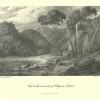
Week 29 – Impressions of the mainland
On land Sunday 4 September finds Samuel Stephens deeply depressed. ‘I cannot and will not endure this state of things it shall be mended by some means or other’, he confides to his diary. He and Captain Martin put their heads together and the experienced captain devises a plan to try to get everyone working […]
Share this page:
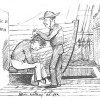
Week 29: Discipline and Punishment
We visit the Africaine this week to meet young Margaret Clark. Margaret is a servant girl for the Gouger family and she often finds herself in trouble! This week is no exception as Margaret has just bitten another servant girl on the arm until she drew blood and left teeth marks in the girl’s skin. […]
Share this page:
Saturday 3 September 1836
… In the everning had family worship Mrs Bear is
much better and I had the pleasure of seeing her
children restored to her and she acknoledge them which
she has not lately, I believe this is an answer to prayers.
Share this page:
Friday 2 September 1836
This 24 hours squally weather from the NW to SW employd wooding and other nessary jobs the doctor of the Rapid visited the sick to day we let go the seacond anchor blowing hard In the everning had family prayers in the cabin
Share this page:
Wednesday 31 August 1836
This 24 hours calms and plesent weather employd painting taring and other jobs as needfull we caught a few fish of the salmon kind We had family service in the everning but as it was late and we tired the service was dull I hope by gods grace to be more [h]artyer for the futer
Share this page:
Monday 29 August 1836
This 24 hours moderate breeses from the south employd taring painting and fitting the riggin In the everning had family prayer in the cabin
Share this page:
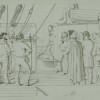
Week 28 – A wedding on the beach
On land Things are looking up at the tiny settlement of Kingscote. We start the week with a wedding on board the John Pirie. Mary Ann Powell, who travelled as an emigrant in steerage with her two…
Share this page:
Thursday 25 August 1836
… I had the people
called aft to know if they where satisfied to have Mr
Dorey as third mate all was willing but Jones and
Jameson We had family prayers after the employ of the day
Share this page:
Friday 26 August 1836
This 24 hours squally with rain we tracked our casks from the Island to the well and returned with 5 full employed otherwise as needfull In the everning had family prayer read the 3d chapt by Hebrews
Share this page:
Saturday 27 August 1836
This 24 hours light winds and cloudy weather sent one boat to fetch the men from the watering place and employd clearing and cleaning the decks we sent a boat to the L M Pellam and received 5 oars In the everning had family prayer and prayed for a speritual sabath the doctor of the […]
Share this page:

Week 27 – a scandal averted
At Kangaroo Island Samuel Stephens is gradually settling into a routine, although his habit of rising well before 6 am in the middle of winter cannot endear him to his men. He sends the company stock …
Share this page:
Thursday 18 August 1836
This 24 hours calms and clear weather employd taring the riggin and watering I attended the watering party the seacond mate being some time sick In the everning had family prayer I felt it a blessing to draw nigh to god at a throne of grace and tell him all my cares and troubles
Share this page:
Saturday 20 August 1836
This 24 hours fresh breeses and clear weather employd watering and cleaning the ship In the everning had family prayer we belive God heard and answered prayer
Share this page:
Monday 15 August 1836
This 24 hours mostly increasing breeses employd as needfull I went with a crew to the well for water it yealds little returned with two casks In the everning had family prayer I found the throne of grace yeald more of the waters of eternal life than the well we where dipping at did yeald […]
Share this page:
Wednesday 17 August 1836
This 24 hours light winds and clear weather employd mostly watering the ship a few taring five sick took 8 casks left 2 men all night to fill. In the everning had family prayer
Share this page:
Friday 19 August 1836
This 24 hours light winds and clear weather employd watering and other jobs as needfull after the employment of the day had family prayer and lay down tired and warey
Share this page:
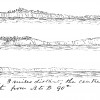
Week 26 – the expanding settlement
On Kangaroo Island The fledgling settlement on Kangaroo Island is now into its third week and it is not a happy place. Samuel Stephens and Captains Morgan and Ross are increasingly anxious about their…
Share this page:
Saturday 13 August 1836
This 24 hours light winds and clear weather at half past 6 AM hove up the anchor and moved the ship but came to anchor again for want of water over the flats at 1 PM hove up again and moved to a more convenent place for wood and water we anchored in quater less […]
Share this page:
Friday 12 August 1836
This 24 hours gentle breeses from the North employd shifting our dry provitions in a dry and safe place in the after hold I took three men with me to the well to git it cleard out and sink a cask to git our water it is about 5 miles from the ship or rather […]
Share this page:
Thursday 11 August 1836
This 24 hours fresh breeses from the NE employd clearing the decks. I took a boat and sounded the harbor In the everning had family prayer read the 4th chapt St Peter found the word profitable and powerfull to [h]eal the wounded soul in shore wher no eye seese nor ear [h]ears but our gods […]
Share this page:
Wednesday 10 August 1836
Most part of this 24 hours calms and light winds employed getting the companys things on short and stowing our own away In the everning had family prayer read the 3d chapt of St Peter I find it a good and plesent thing to love the Lord to be able to cast my care on […]
Share this page:
Tuesday 9 August 1836
This 24 hours mostly strong winds from the SWd
employd getting the companys stores on shore and
received on board 13 casks of beef and pork three men refused duty today
In the evening had family prayer a few attended
read the 1st [?] chapt epist of St Peter.
Share this page:
Monday 8 August 1836
This 24 hours gentle breeses from the NW employd all day gitting the companys things on shore In the everning had family worship read part of the 3d chapt of St Johns gospel to as many as whould attend Mr Richards and myself prayed O how good to have the Father of our Lord Jesus […]
Share this page:
Friday 5 August 1836
This 24 hours light winds and rain at times employd gitting the stores on shore In the everning had family prayers eleven attended the times are trying iniquity abounds curseing and swareing is where ever you are most of the L M Pelhams crew serve the prince of the power of the air and in […]
Share this page:
Thursday 4 August 1836
This 24 hours gentle breeses from the westward AM got under weigh and moved the ship where we intend to land the colonian stores came to anchor in about fathoms water with 18 fathoms cable made a raft and got it along side ready for discha rgeing in the everning had family prayer ten attended […]
Share this page:
Wednesday 3 August 1836
This 24 hours mostly strong winds attended
with rain I had the people called on the quater
deck to know the reason they refused to land the
passengers things they sayd Mr Stevens had promiced
them fivety pounds and they whould not work till
he paid them so I let it stand till farther advice
the two men came from the farm Mr Stevens was
not on board but had bing makeing signals
on shore and no one preceived him
we had family prayer in the everning I went
to bed as usal and was disturbed some time after
by hereing Mr Stevens going on in a most unman
ly way it appears he was hurt in not being heard
when these men where on board for he wanted to
be on board to receive them I heard him say it
was an eternal disgrace to the captain an eternal
disgrace to the officers and crew and he should
write to the directors and inform them and he was
a magestrate and so on and said he should like
to see the captain but surposed I was asleep so I got
up and told him what I thought of his conduct
dureing the time I have had to be with him as to
his moral conduct I have known when we have
bing in our extrimities he has bing lost and as his
conduct towards Mr Bear and family has bing
such as no one but whould disapprove off he has
came into the cabin tore down the curtains got
a horse wip and thretned to horse wip Mrs Bear
and has told Mr Bear in the hereing of his wife
that he whould banish him and his family to
any part of the Island and cut off his supplys
the poor whoman is now raveing mad with four
helpless babes on board with the sister of Mr Bears
who is over come with the good qualities of Mr Stevens
at the age of fivety Mr B disapproves of such conduct
well god makes the ungodly his rod but either to
they can come and no farther Mr Stevens I under
stand has bing down where the people lives and
paid them fivety pounds – so ended this day
Share this page:
Sunday 31 July 1836
Letter to George Fife Angas
H.M.S. Buffalo
St. Helen’s July 31 1836
My dear Sir,
….The Tam O’Shanter came in to these roads
shortly after us having been also driven back. The
Captain reports all his emigrants well, with the
exception of a Mrs Stuckey who is considered by the
surgeon to be rather in some danger. The Dr of the
Buffalo & I have considered his report in the
case and are of opinion it is not more than
a severe attack consequent on sea sickness.
…
Believe me always my dear Sir
with greatest esteem Yrs faithfully
Geo Stevenson
G.F. Angas Esq
Share this page:
Wednesday 27 July 1836
This 24 hours gentle breeses and clear weather
AM we ran down close to the reefe which forms the
harbour of nepean bay found the entrance and
at 10 or half past came to anchor in three
fathoms water in neapean bay gave the
ship 30 fathoms cable but we found we had not
preceived it was flood tide and at ebb found our
selves aground NB at 10 PM in 2 fathoms water but perfectly safe
the water being perfectly smooth we got out all our
boats and anchored them in shore and got ready
for moveing when the tide suits we landed the
colonan manager and Mr Bear and we went to gather
to look for the lagoon but had to return unsucksess
full night comeing on
In the everning had family worship I could not
but see and admire the singular hand of god in our
safe deliverance through the track less ocean and bring
ing us safe to these uncultivated shores no sooner than
we had come to anchor and the sails firld than a
covenant bow extended its self on shore from one bow
of the ship to the other in all its beauty O how true
is Jehovah to his promices to his family on earth
how good has he bing to us when passing through
the tempestious ocean my peace flowed like a
river not a cloud did arise to darken the skys
or hide for a moment my Lord from my eyes
once more was I enabled to bow before the Lord on
the land
Share this page:
Saturday 23 July 1836
July 23. Saturday. Weather fine, & wind NW with every appearance of
a change in our favor. 8. Governor Hindmarsh & family,
J.H. Fisher, Esqre (Colonial Commissioner) & family, came on board.
Noon. Do Wr [Ditto Weather] 1.30. Weighed anchor & stood out, but soon after, the
wind drawing round to the Westward, & the sky assuming a wild
look, we tacked, stood into St Helen’s road, and anchored. at
2.30. Mr T.H. Fisher landed on Isle of Wight. EvengFine. W.S.W.
Share this page:
Friday 22 July 1836
Friday July 22. Went with my family on board the
Buffalo this afternoon. The Ship in considerable
confusion. Trunks, bales, barrels, packages and litter
of all sorts strewed about in most admired disorder.
Determined however to overlook as much as possible
inconveniences, common it is believed to the commence-
-ment of all voyages by sea! Although those which
surround us here appear rather formidable. Our
cabins by dint of soap and paint have been rendered
somewhat more comfortable than we at first seeing
them expected, not withstanding six feet by 71/2
leaves much scope for ingenuity in the art of
stowing away, and affords no more room than
our necessities require.
Share this page:
Wednesday 13 July 1836
July 13th .
… Our cabin party besides Capn & Mrs Duff, consists of ourselves, Mr, Mrs & Miss Brown, the Emigration agent, his wife and sister; Mr & Mrs Hallett, a merchant & purchaser of land who settles in the colony and who is in partnership with Duff; Mr Everard & his wife; and Mr Skipper, the son of a solicitor of Norwich who is articled to Mr Mann, the Attorney General of the colony. The first mate also dines in the cuddy; thus we have the unfortunate number of thirteen!
We fare sumptuously every day – Hot rolls for breakfast manufactured by our excellent black steward, eggs, rice, two sorts of cold meat, coffee, & every tolerable tea. At twelve luncheon: bread & cheese, the last of two kinds, both good, with admirable bottled porter, Hodgson’s pale ale wine & spirits. We dine at four; soup of an excellent quality, two joints, and poultry. As a sample: today we had pea soup, salt fish & eggs, haunch of mutton, fowls and pork – occasionally plum pudding. Then beer, porter, wine and spirits as the French say à la volonté, which is being interpreted, as much as you please. Tea at eight, and the grog bottles from nine to ten. This precision on my part is for the especial consideration of Household [?]. It is true the ducks & geese are sometimes worthy the appellation of matrons, but certainly everything is better than I found it at Ibbotson’s Hotel. Harriet gives the soups unequivocal praise, and while I am writing she is having for luncheon a basin of chicken broth, which calls forth a laudation at every mouthful.
The intermediate party (i.e. between the cabin and the steerage) consists of eighteen persons; one intends to keep an hotel in the colony, Mr Thomas and his family (he is the proprietor of the colonial newspaper), my clerk Mr Nantes, and four proprietors of land in South Australia. They fare differently to the cabin passengers, having fresh meat but once a week, and on other days salt fish, pork or beef.
The labourers and their families occupy the next compartment in the ship. Their number is about 50; they are all contented, and have reason to be so; in this place Mr Pollard & his wife are, with our servants. And now for a word about these. Pollard has volunteered to take charge of the poultry, the pigs & sheep, and my goats. He takes excessive pride in them & boasts of their condition daily; moreover he milks the goats, and performs upon the pigs and sheep when occasion requires the kindly offices of the butcher…
… I must however say at any risk that Capn Duff’s conduct in every respect merits the warmest encomiums; he appears to be a thorough sailor, decisive and skilful; he pays equal attention to all the passengers, has no favorites apparently, & therefore is a general favorite.
Share this page:
Tuesday 12 July 1836
On Board His Majestys Ship Buffalo Portsmouth
July the 12 1836
My Dear parents and friends
I now embrace this opportunity along with
Sir James he intends to leave us tomorrow we have fairly tired him out
Captain Hindmarsh is still in London. He is attending Court to day
to take leave of the King. He is to be here tomorrow and we expect to
get away at the end of the week. I am sure it is quite provoking
the way the[y] have gone on first and last we have been on board since
Friday last. …
… There is a great deal of both ladies and gentlemen going
out with us but they are not come on board yet and a doctor
how many young doctors I do not know. There is another
Scotch family besides us. They came from Fifeshire within 4
miles of Bomino[?] but they do not know Uncle’s folk his name
is Cock he is a joiner with a wife and six children just going
out on his own expense upon chance. He has been this six weeks
at Portsmouth at lodgings and they are very dear here indeed.
There is a great deal of familys going in the Buffalo but they are a [?]
way of us for the children makes such a noise there is 22 in our
mess that is the place that we stop in our beds is six feet long 4 feet wide
They are like press shelfs one above another ours fortunately is an under one there
is no more division than a piece of canvas on the side partition. They are
like my mother’s hens nests. How strange every thing seems here indeed …
… I had nearly forgot to mention
Sir Pulteney’s son that is at Sidney they had a letter from him
two three days before we left London saying he intended to
make Mr. William a present of a few of the finest of Merino
sheep I suppose these will be about a score but he did not mention
how many but they fancy [?] about what I have stated likewise.
Ferguson has a letter to a gentlemans son there the[y] saw his father
in London. He was selling his wooll he is just returned home
but his son is remaining he told Sir James and Ferguson what
sort of management and sheep was most profitable for the Colony
and sent a letter to his son to render them all the assistance
he could. Every [thing] still appears promising and if we are just favoured
with our Heavenly fathers countenance and protection there is
about 20 of the Royal marines goes out to protect us from our
earthly enemies. There is also a paper to be printed weekly in the Colony
their was one printed before we left London I got a copy
of one which I intend to send along with this …
… I must now stop and wish you good
bys I wish you may be able to make out this scrawl I am far from
you but I have every kindness shown me, more than I ever
expected in my station of life, and more than that one of the kindest
and best of husbands I could desire. If it is the almighty will to spare
us to [?] if not that we may be enabled to undergo what
ever he thinks proper to afflict us with. Ferguson joins me
with sincerest love to you all …
… so good bye and believe us ever your affectionate son and
Rosina Ferguson
July the 12/ 1836
Thursday morning Spithead we have got this far now…
… After you have read the paper you may
send it to my father in law Hardy [?] perhaps will like to see it.
Sir James has made me a present of a pounds worth of little cake.
It is beef boiled till it is like glue. In case I am sick we dissolve it in
water and it is like beef tea. Now my dear parents I hope you will I seriously
beg of you not to make yourselves unhappy about us for we are
very comfortable, as much and more than we could expect.
I will not let one opportunity slip of giving you every detail of how we are and how we get on…
Share this page:
Sunday 3 July 1836
On Thursday, June 30th at four o’clock Harriet & I joined the Africaine at Gravesend which immediately afterwards moved down with the tide. To those who know my wife’s ardent attachment to her family and their unsurpassed love for her, a description of her anguish at parting and state on embarkation would be superfluous – they can imagine it all; … Fortunately the weather was delightful; the light winds that blew gave hardly any perceptible motion to the ship, and were refreshing in the extreme. Sleep aided to restore her, and by Saturday afternoon when the Africaine anchored off Deal for the reception of the Captain & some of the party, she was in good health and spirits.
In the course of the afternoon Capn Duff and his wife came on board. They had been married but on the previous Thursday; a circumstance which had caused a little delay in the departure of the ship from London; with them Mr & Mrs Hallett arrived. On the following morning Mr & Mrs Brown were received on board, and with them the number of passengers was completed…
The vessel being in disorder in consequence of her this day commencing her voyage, prayers were not read; some books were however distributed among the passengers which had been supplied by my friend Mr Binney for the use of the ship during the voyage, afterwards to be given by me to some public religious institution. On conversing with some of the labouring emigrants, I find they are desirous of establishing a school on board for the instruction of some of the party who are unable to read. When the first trials of the passage are over, this will be a subject for attention. Letters were sent home from Deal to numerous members of our families.
Share this page:
Monday 4 July 1836
Most part of this 24 hours strong winds from the SW all resqusite sail set steering ESE employd as needfull Lattd Obsd 38.19 South Longd 95.50 East In the everning had family prayer read the Psalm for the day with suited hyms what a mercy a worm is allowed to come to God through Christ
Share this page:
Wednesday 29 June 1836
This 24 hours strong winds from the NWd cloudy weather all resqusite sail set steering SE by E½E No meridian allt In the everning read the 14th chapt of the Gospel of St John to the little flock and found my own soul near to God in Christ after the firey darts of the enemy […]
Share this page:
Tuesday 28 June 1836
This 24 hours mostly strong winds from the NW with a heigh sea all resqusite sail set Steering to the Eastward Lattd 37.50 South Longd 69.41 East In the everning read to the little flock 8th chapt by Jerimiah Mr Richards and myself prayed and God seemed to be with us the Lord has once […]
Share this page:
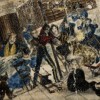
Week 19 – farewells and new beginnings
This week sees the unhappy passengers and crew of the Cygnet still anchored in Rio Harbour. While Boyle Travers Finniss chafes under continuing delays, the crew mutinies, refusing all work. …
Share this page:
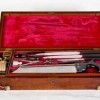
Week 17 – wet weather and wild tempers
Both the Duke of York and the John Pirie are making good progress, as freshening winds drive the ships forward at speeds of between eight and nine {tooltip} knots {end-text}The speed of ship or wind in nautical miles per hour. A float is dropped overboard and the speed is indicated by the rate at which […]
Share this page:
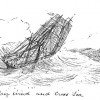
Week 16 – towards Australia
Both the Duke of York and the John Pirie are now steering south east towards Australia, a novelty they appreciate. Although it brings bad weather and rough conditions, the travellers on the John Pirie also welcome the cooler conditions, after being ‘almost stew’d alive for a Month’. There is an interesting comment here on the trying conditions of everyday […]
Share this page:
Sunday 29 May 1836
This 24 hours strong winds and cloudy weather all sail set standing to the SWd wind from the east ward with swell Latt Obsd 24.24 S Longd by chr 14.24 W In the morning read the psalms and prayd for a good sabath blessing the text to day was That yee stand fast in one […]
Share this page:
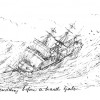
Week 15 – high drama on the John Pirie
It is a week of high drama on board the John Pirie. First bad weather whips up heavy seas. The passengers all huddle on deck trying vainly to escape the leaks, only to be drenched by a sudden wave that washes right over them. This frightens the ship’s cat so much that he leaps overboard […]
Share this page:
Thursday 12 May 1836
12th. Rainy, and light breeze from E. and by South, apparent the beginning of [tooltip color=”grey” text=”Regular winds which move towards the equator within or near the tropics, the earth’s rotation dragging them such that in the northen hemisphere they blow from the north-eastward and in the southern from the south-eastward.”] trades [/tooltip]. Within the last two or three days the decks have been cleared and the passengers below, made comparatively comfortable. A great deal of [tooltip color=”grey” text=”A ship pitches when its head plunges up and down under the action of waves.”] pitching [/tooltip], wife and myself sick. Up to this period of the voyage saw very few [tooltip color=”grey” text=”A family of marine fish (Exocoetidae family) consisting on some 64 species. The species’ defining feature is their wing-like pectoral fins used for gliding above the water’s surface for up to 50 metres. Flying fish live in all oceans, but are particularly prevalent in warm tropical and sub-tropical waters.”] flying fish [/tooltip], and those not till we passed St. Antonio. Scarcely any birds, one tropical bird was seen 2 days S. of St. Antonio. [tooltip color=”grey” text=”A medium sized fish in the Mackerel family.”] Bonito [/tooltip] and [tooltip color=”grey” text=”A type of tuna fish found in all tropical and temperate oceans.”] Albacore [/tooltip] were seen in great numbers. Some of these fish were seen to leap upwards of 20 feet out of the water, and to spring horizontally upwards of 30 feet, apparently in pursuit of the flying fish. The [tooltip color=”grey” text=”A jelly like marine animal (more commonly known as a bluebottle jellyfish).”] Portuguese man-of-war [/tooltip] was met with, of a large size, before reaching the Cape Verdes and afterwards very frequently but smaller. The top of the sail they put up is tinged with rose colour and the lower part reflects [?] the blue of the tendrils.
Share this page:
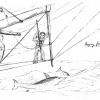
Week 12 – Crossing the line
As the Duke of York nears the Equator the crew hopes to have a bit of fun. Crossing the Line ceremonies were common on sailing vessels and often involved ‘King Neptune’ coming on board to ‘baptise’…
Share this page:
Saturday 7 May 1836
There has been a fresh Breeze all Night from E,N,E,
and at 8, A,M, took a [tooltip color=”grey” text=”Seafarers reduce sails in strong winds so that ships can move more safely and comfortably. Sails are made with rows of small ropes attached to them and these are tied around spars to reduce the amount of sail exposed to the wind. The amount of sail taken in by securing one set of ropes is called a reef. The action of reducing sails is called reefing and the knot that is used to tie the ropes is called a reef knot. In light winds all the reefs are taken out and the full size of the sail is exposed to draw full power from the wind.”] reef [/tooltip] in the [tooltip color=”grey” text=”The top sail on a foremast.”] Fore-top Sail [/tooltip], for the
first time since leaving Dartmouth, and at 11, A,M, had
the Islands of Brava and Fogo, (two of the Cape Verde)
right abeam of us, the former about 20, and the latter
40 Miles distant, on the larboard Side, it then fell
[tooltip color=”grey” text=”Without wind.”] Calm [/tooltip], and remain’d so untill the Eveng, during which,
the heat was excessive ____ We saw a great number
of [tooltip color=”grey” text=”A family of marine fish (Exocoetidae family) consisting on some 64 species. The species’ defining feature is their wing-like pectoral fins used for gliding above the water’s surface for up to 50 metres. Flying fish live in all oceans, but are particularly prevalent in warm tropical and sub-tropical waters.”] flying Fish [/tooltip], this Morng and in the Afternoon were
follow’d by a Shark, that broke two fishing Lines, and
a strong Hook, when One of the Sailors found a proper
Shark-hook, on to which he put a piece of Pork,
for Bait, and gave it to the [tooltip color=”grey” text=”Short for Captain.”] Capt [/tooltip], who in his eagerness
to catch the Fish, did not notice, that there was no Line
made fast to it, but immediately threw it overboard, which
caused a hearty Laugh, and most probably saved the Sharks
life, for we could not find another One, strong enough
to hold him ___________
Share this page:
Tuesday 3 May 1836
This 24 hours the wind from the eastward gentle breeses and cloudy weather steering S by E employd fitting the Whaleing tackling saw black fish Lattd Obsd 7.30 N Longd 22.37 West We have made 2596 miles these last nine days read in the morning the 6th chapt of Leviticus with commentry at noon the […]
Share this page:
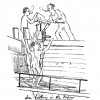
Week 11 – ‘dangers stand thick all around’
At long last fair conditions prevail for the travelers and they make good progress. But danger still stalks the Duke of York. Lucy Beare becomes dangerously ill and almost dies. Reading…
Share this page:
Friday 22 April 1836
This 24 hours gentle breeses from the NEd all sail set steering SW people employed variously Lattd Obsd 32.21 N Longd 9.58 West In the everning had family prayer read the 8th chapt of St Matthew with tract commentry
Share this page:
Thursday 21 April 1836
This 24 hours gentle breeses from the ENE all sail set steering SW people employed variously Lattd Obsd 32.21 N Long 19.58 West In the everning had family prayers read the 8th chapt of Matthew with the tract commentry the mate and myself spoke to the people on devine things
Share this page:
Wednesday 13 April 1836
Most of this 24 hours strong winds and cloudy weather with all resquisite sail set at half past 7 tackd ship to the North and duble reeft the at 7 PM and tackd again to day ceveral sail in sight people employd variously Lattd Obsd 49.12 N Longitud by chro 5.58 West In the morning […]
Share this page:
Monday 4 April 1836
At dawn of day I gave orders to the chief officer to get
up the seacond anchor he returned said the people
wished to speak with me after reading the word of
God as usall and commending my all to the God
of all grace I then went out to the people they
told me they whould not go out of the port
without monthly wages I said they aught to have
considered this before they signed [tooltip color=”grey” text=”When seafarers joined a ship they signed the articles. The captain signed them as well and they formed a contract that set out conditions of employment including how much crew would be paid, what food they would be given, and what hours they would be expected to work. The articles would also say that if a ship was in danger, the normal expectations of work would be set aside and the captain could call on his crew for whatever was needed to save the ship. The articles could form the basis for shipboard discipline, giving the captain authority to punish seafarers who broke them.”] articles [/tooltip] I
asked them if they whould move the ship in
a safe place or a safe harbour they refused
to sail out of torbay Mr Stevens read the articles to them
Mr Stevens and myself went on shore for advice
from the [tooltip color=”grey” text=”Shipping agents provide local knowledge and represent ships in port. Their job is to provide anything that a ship might need. They may arrange a pilot to navigate a ship out of port, arrange clearances from customs or buy stores from local suppliers.”] agent [/tooltip] came on board and offered
the people fivety pounds if they would proced
and if Whales came in the way to heave all
lumber over board that whould stop us Whale
ing for that was thier princable grevance but
they refused and whould not remove the ship
to a safe harbour Mr Stevens went on shore
went to Dartmouth and returned with Captn
Talbert of the royal navy and Mr Inkston
Loyds agent he had on his uniform with his
men with [tooltip color=”grey” text=”A pair of pistols.”] brace of pistols [/tooltip] he called for me
to bring the articles and call the mens names
over I did so he asked the men if they signed
these [tooltip color=”grey” text=”When seafarers joined a ship they signed the articles. The captain signed them as well and they formed a contract that set out conditions of employment including how much crew would be paid, what food they would be given, and what hours they would be expected to work. The articles would also say that if a ship was in danger, the normal expectations of work would be set aside and the captain could call on his crew for whatever was needed to save the ship. The articles could form the basis for shipboard discipline, giving the captain authority to punish seafarers who broke them.”] articles [/tooltip] which they replyd they did
he questioned them if they had any complaints
to make of my conduct towards them they
said no they where satisfied with the ship and
officers said the desipleing was good Captn
Talbert took Prichard the ringleader on shore with him
all the rest on board with the exception of Riley agreed
to go to thier duty – …
Share this page:
Friday 1 April 1836
The wind at SE most of the ships in harbor got under weigh I went on shore to foreward the trades people four came off and others on shore fitting a chock for the windlass the blacksmiths doing thier work allso the wind shifted again to the westward and the rain fell in torents the […]
Share this page:
Friday 25 March 1836
After commending my all to God and his grace
went to my days duty the wind from the SWd blowing
fresh gave the ship 20 fathoms more cable went on shore
with Mr Stevens went to the agent ordered a few neces
arys for the ship and passengers visited a pious fisherman
wife in our socierty and pertook of the humble fare …
… God
only knows what is before us therefore I commit all
into his care and keeping
Share this page:
Friday 11 March 1836
– I felt it a disappointment not receiveing a
letter from her I tenderly love the partner of my life …
sharer of my cares though so much absent from each other
which makes our parting so severly felt like cutting the
tender string of life or the divideing of vine and branch
I have wrote home but received no answer but belive all
will be well for time or Eternity thanks be to God and
His grace …
Share this page:
Tuesday 8th March 1836
– received on board the [tooltip color=”grey” text=”To navigate difficult stretches of water, ships took pilots on board. Pilots were coastal navigators with knowledge of their local waters and they captained the ship through the channel or harbour.”] pilot [/tooltip] hove up …
anchors and made sail the wind at north I felt …
us for a letter but did not receve one tharefore I was led [to?]
trust and leave all in the hands of the God of all gra[ce?]
the cost of England looked delightfull as we sailed by
but soon it looked like a cloud at 7 PM tacked ship
Portland light in sight …
Share this page:
Saturday 12 March 1836
This 24 hours blowing hard from the westward let go the
seacond anchor …
… felt ankious not receiveing letter .
Share this page:
Tuesday 8 March 1836
Extracts from letter, Captain Robert C Morgan
Recd March 9th 1836
G Fife Angas Esq
Jeffrey’s Square
St Mary Axe
London
Bark Duke of York March 8th 1836
off the Isle of Wight
Dear Sir
under a sense of the love and
favour of God I address these few lines to
You as the chief friend and counceler and
director in this important station of life
I am placed in both in regard to Yourself
and the Company how far I may give
satisfaction I know not but I look up
to God in Christ to be guided with
wisdom and grace …
we were compelled to put in here by
adverse winds and our time has bing
employd in getting ready for sea I have
kept the people and passengers on fresh meet
wile here beliving that to be both cheap
and best for the people and I likewise
I have got a few things here that we were
short off which I trust you will approve off
the wind is now fare from the North
and I hope by the blessing of Him who
hold the winds in His fists and holds
the waters in the hollow of is hand will
conduct us to our place of destine were
we may all fullfill our station of life
We use family service on board and keep
the Lords day and expect the Lords blessing
which He has allready favoured us with
Mr Stevens [illegible word] I belive to be a sincere
Christan and Mr Bear [Beare] I belive will prove
a serveseable man if spared to the
Company I still feel some anksierty
concerning the Ships Cofer if You can give
me any directions or council concerning it
the first oppertunity I will be glad
fare well dear Sir praying You and Yours
every blessing for time and Eternity for
our Redeemers sake Amen
Yours affectonately Robert C Morgan
Mr Stevens haveing nothing perticular to write
desires his respects Mr and Mrs Bear [Beare] and family
are all well the work men allso
we now have a fair wind and shall make
the best farewell Sir
Share this page:
Source notes for correspondence
Captain Morgan’s letter to Angas 8 March 1836 Captain Robert Morgan, of the Duke of York, wrote to George Fife Angas on 8 March 1836, while the ship was off the Isle of Wight. The letter was received by Angas the following day. The original of the letter is held in the State Library of […]
Share this page:
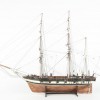
Week 01 – Setting sail
On 25 February 1836 Captain Robert Morgan sat down in his tiny cabin on board the Duke of York to begin a diary of the long sea voyage to the new Province of South Australia. He was well aware that the journey he faced would be long and perilous, indeed the route to Australia was one […]
Share this page:
Thursday 25 February 1836
10 AM left my family in the hand of God at home
[?with a]ll.things needful for life and godlynesse glory be to God
… my christian brother English in company we went on
[?boar]d of the [tooltip color=”black” text=”A packet was a ship that ran a regular route between two ports and had a government contract to carry the mail, in this case powered by steam rather than sail. The ships also carried passengers and cargo and the mail contract was seen as a mark of their speed and reliability.”] steem packet[/tooltip]and landed safe at gravesend where
Captn Pryn joined us and we came on board of the Duke of York
… after dinner all hands with most of the passengers assembled [?]
… on the quater deck haveing hoisted the Bethel flag…
… ist head we commenced the worship of God with singing
…
Captn Pryn offered a most affectionate prayer to
Allmighty God for us and all mankind many tears was shead
and I hope the seed sown that will be blessed of the Lord
without whose help the labourer laboureth in vain I went on
shore after service and bid farewell to my christian Bretheren
knowing not if I shall see them again in the flesh but God
knows that will surfice –
Share this page:
Aboriginal inhabitants in 1836
The accounts of Matthew Flinders, Charles Sturt and other early explorers had shown the new province to be occupied by Aboriginal people, but their numbers, disposition and ways of life were almost entirely unknown in England. The British Colonial Office, keen to avoid the bloodshed that had accompanied the settlement of New South Wales and […]
Share this page:
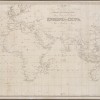
Home
Bound for South Australia Between February and July 1836 nine ships left Britain bound for the newly created province of South Australia. Estimates of the precise number of intending settlers on board vary between different historical sources. The 1837 report of the South Australian Colonization Commission claimed 546, all hoping for a better life on […]
Share this page:



Recent Comments